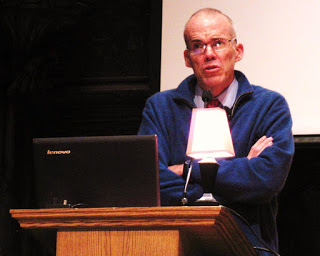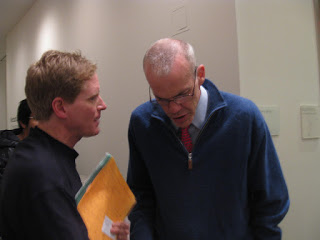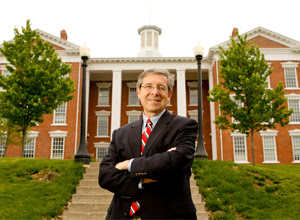 |
| William Jewell College, Liberty Missouri |
 |
| Bill McKibben speaking at Washington University in St. Louis photo by Brian Ettling |
November 1, 2012, I saw climate activist Bill McKibben speak at Washington University in St. Louis. He had so many insightful and inspiring words for me in others in the audience about the problem of climate change and the actions we must take to reduce the threat.
 |
| Brian Ettling meeting Bill McKibben |
One specific item, he asked his audience to do was to ask their college or university as a student, professor, alumni to divest its financial endowment fund from fossil fuel companies. He even challenged college faculty, especially those with tenure, to even get arrested as a best way to protest that action must take place now on climate change. He assured them that, “getting arrested is not the end of the world. The end of the world is the end of the world.”
When he asked the students at Washington University in St. Louis to petition the board of trustees to divest from fossil fuels, I marveled how Wash U students, such as Rachel Goldstein and Adam Hasz and former student, Arielle Klagsbrun, immediately wanted to take up the challenge.
In a reception to meet Bill McKibben, these brave activists enthusiastically talked about how they wanted to petition the board of Trustees at Washington University in St. Louis. They all acknowledged it would be a very steep uphill fight. In particular, Gregory H. Boyce, Chairman and CEO of Peabody Energy, the world’s largest private-sector coal company, sits on the board. Without a doubt, Gregory Boyce would fight hard against any attempt by Wash U to divest its endowment from fossil fuels.
After hearing and seeing how committed these students and former students were to taking action, I decided I must do the same. I decided to approach my alma mater, William Jewell College. My goal to plant seeds among students, faculty, and the administration to start a campaign to petition Jewell’s Board of Trustees to divest from fossil fuels. December 2012, I contacted Facebook friend, Dr. Gina Lane, who is a professor of communications at William Jewell College. She responded immediately my idea “that it is a really good one.”
 |
| Dr. David L. Sallee, President of William Jewell College Photo: jewellalumni.com |
Dr. Lane encourage me to contact student Tyler White, who is a senior and Student Senator, and Dr. Andrew Pratt, Vice President for Social Responsibility and Engagement. Dr. Pratt is also Director of William Jewell’s Center for Justice and Sustainability. Dr. Pratt then advised me to send a letter to the President of William Jewell, Dr. David L. Sallee.
This past Thursday, I composed the letter. On Friday, I mailed the letter. Under no circumstance am I under the illusion that writing a letter to Dr. Sallee will magically make William Jewell College immediately decide to divest fossil fuels from its endowment. My objective is to get the students, faculty, alumni, and administration thinking about it.
 |
| Photo: plantwhateverbringsyoujoy.com |
My focus is long term. It will be similar to the analogy of “water wearing away the stone” that I first read about in environment activist, Julia Butterfly Hill’s book, The Legacy of Luna, which was released in the year 2000. On page 210 in the book, Julia talked about her direct ongoing negotiations with John Campbell, President of Pacific Lumber to save the Redwood Tree, Luna. In the months of conversations with Campbell, Hill described her interaction with him like this,
“I was like water wearing away the stone. Water acts differently than a hammer and chisel, which chip away at something. I was just a constant presence that sooner or later would be heard. Not because I pound the message, but because I am always there.”
For William Jewell, this movement is coming there way. Or, if it was a movie ad campaign, you could say the 350.org Fossil Free Divestment campaign is “The following is a PREVIEW of political movement coming soon to a college campus near you.” In December 4, 2012 New York Times article, half of the Harvard University Student body voted 72% to support the demand that their school trustees divest its endowment from fossil fuels. In 2013, three US colleges have now pledged to divest its endowment from the two hundred fossil fuel companies.
 |
| Photo of Brian Ettling surfing in Hawaii, 2008 |
The tide is coming. My alma mater will have to decide whether it wants to be front of, behind, or riding the crest of the wave. When I was a student there in the late 1980s, William Jewell did the right thing by divesting from companies supporting South Africa’s apartheid. Now it it must act to divest from fossil fuel companies that are wrecking havoc on our global climate.
Below is the letter that I mailed to President Sallee at William Jewell College yesterday.
February 8, 2013
Dr. David L. Sallee, President
William Jewell College
500 College Hill
Liberty, Missouri 64068
Dear. Dr. Sallee:
My name is Brian Ettling. I am a 1992 William Jewell graduate. I majored in Business Administration. Since graduating from Jewell, I have worked as a park ranger in the national parks, Crater Lake National Park, Oregon, and Everglades National Park, Florida. While working in the national parks, I developed a deep passion about climate change. As a result, for the past several winters, I am a climate change communicator and organizer in St. Louis.
Last November, I got to see climate activist, Bill McKibben speak at Washington University in St. Louis. McKibben’s remarks inspired me to get involved with his 350.org “Do the Math” campaign. This campaign petitions colleges and universities across the U.S. to divest their portfolios and endowment holdings from large fossil fuel companies.
I am sending this letter to you for my alma mater, William Jewell, to do the same. I am a very proud William Jewell graduate. I would not be where I am at today as a Climate Change Communicator without the incredible education I received at William Jewell. My communications classes from Jewell were so helpful for me to provide techniques for giving presentations as a national park ranger, public speaker, and organizer in St. Louis.
Over the past two months, I contacted communications Professor Dr. Gina Lane, student Tyler White who a senior and Student Senator, and Dr. Andrew Pratt, Vice President for Social Responsibility and Engagement. I approached each of them for advice how to start a campaign for William Jewell to divest from fossil fuel companies. Dr. Pratt suggested that I contact you.
During my time at Jewell, the Board of Trustees decided to divest from South Africa. At the time, I was very openly critical of this action. I now know that I could not have been more wrong. My William Jewell education helped me to see the true evil of South African apartheid and the importance of voting with your money to disavow such a total injustice. Only two years after I graduated from Jewell, I worked with South African citizens at Death Valley National Park. I asked them about apartheid. They told me that it was wrong and it had to end. Even more, they told me the divestment campaign started in US colleges and universities did convince their countries leaders that apartheid had to end.
Climate change is the biggest threat to our future and even bigger threat to future generations, such as all the students attending William Jewell. In 2012, we had a record heat wave and drought in the Mid West, Hurricane Sandy devastating coastal New Jersey and New York, the Arctic Ice is melting at an unprecedented rate, etc.
I was on the wrong side of history with apartheid while I attended William Jewell. This time, I want to be on the right side of history. I want to be on the record to persuade the students, alumni, William Jewell’s college leaders and trustees, and you to take leadership to divest from fossil fuels to save us from dangerous climate change consequences.
Sterling College in Vermont recently announced it is proud to be the third college in the United States that will soon divest its endowment from the two hundred fossil fuel companies. The Board of Trustees voted unanimously at its February 2, 2013 meeting to instruct the investment team to take this action and to move swiftly to divest.
Sterling College President Matthew Derr said, “Sterling College is an incubator for those who care about Vermont, care about the natural world in which we all live, and who want to promote healthy and just food systems, and as such, it makes no sense for us to invest in companies that are wreaking havoc on our climate.”
Thanks for allowing me to share all these thoughts with you. I am including article from December 4, 2012 New York Times talking about how college campuses are organizing campaigns to insist that the college leadership divest from fossil fuels.
Hope to hear back from you soon.
Brian Ettling
